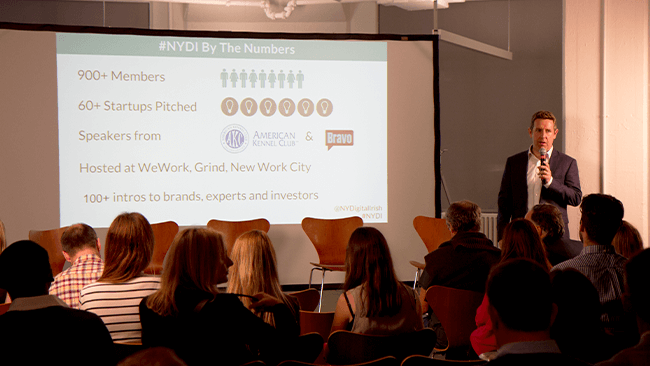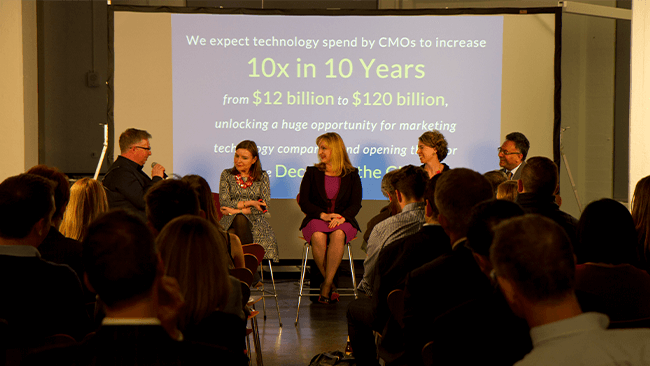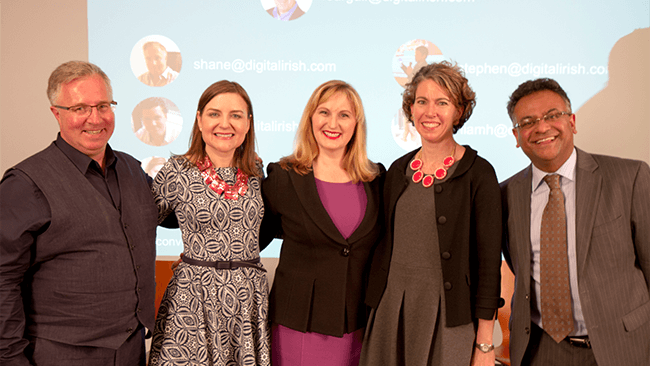Thank you to everyone for attending New York Digital Irish April meetup on April 22nd.

The theme of April’s event was “How to get to the CMO”; providing insights for tech companies who are currently selling Marketing Solutions Technologies. A team of experienced CMO-panelists informed the crowd of the ‘No-nos’ and the ‘Yes please’ techniques to get and keep their attention when pitching (Note to self: delete that draft email pretending the CEO will be in the town of prospective lead next Tuesday).

Advice:
Below is a recap of the panelists’ expert advice for pitching to CMOs:
- Don’t say that your technology can do everything. Articulate specifically what it is that you do well. This will make your pitch and your company seem much more focused.
- Do research the CMO before attending your first meeting. You have the resources of Twitter, LinkedIn, Facebook and Instagram at your disposal. Use them. If you can establish a personal connection or commonality with the CMO – you‘re instantly more memorable than every other company pitching to them. (You might even have a person in common who could influence them towards subscribing to your service!).
- Don’t let your first contact with your prospective client be an email to the CEO. If your pitch comes across well, it will be sent to the CMO afterwards anyways. But, by making this error, you’ve already added tension to this relationship.
- Don’t tell the CMO how to do their job in your pitch. You will lose their attention if you act too arrogant about your technology.
- Do ask questions. Remember that you do not know their company as well as the CMO does. Ask them where their ‘weaknesses are in Marketing?’ and what are they ‘looking to improve?’. You will seem more confident in your product if you can answer on-the-spot questions related to its application, instead of rhyming off the same pitch that you use on everyone.
- Don’t send a blanket email to CMOs saying “the CEO will be in your area if you are free to meet”. Do not do this. Ever. This approach is transparent, lazy and might put a bad taste in the CMOs mouth no matter how great your service is.
- Do ask “Who is going to pay for this technology?” if you are pitching to an agency. If the answer is ‘the client’ rather than ‘the agency’, this will help you to assess how long the sales process will take with an interested agency.
- Don’t act too urgent. Yes, you want to get that sale into this month’s figures rather than next month’s (or the next), but acting like you have to close this sale NOW may help you lose the deal. Let your prospective client breathe and they will be more likely to become a client.

Startup Pitches
The evening was rounded off with an Shark Tank style pitch session. Representatives from 2 marketing solutions companies each made a 5 minute pitch in front of the evening’s CMO panelists. Then, they let their efforts be critiqued in front of a 100+ strong audience (talk about nerve-wracking!).
Companies taking part were:
Newswhip represented by Kevin Lowe – an Irish founded content discovery platform helping you figure out how much social traction your content receives online. Good for journalists, PR companies and content marketers.

Clavis Insights represented by Danny Silverman – a platform dedicated to propel the success of eCommerce sites using insights for online retail store analytics.

Not to point fingers, but the general advice on improving future pitches took the following tone:
Know your audience: Remember that you are pitching to a prospective client not a prospective investor (which you may be used to as a start-up). Focus on what your company can do to help the individual and not the general population/industry.
Tell a positive story: Prospective clients want to hear how your service has benefited other businesses who have used it. Tell them. ‘Use-case scenarios’ make your service seem more relatable. This helps paint scenarios that the CMO could imagine themselves using your product in.
Competitor Comparisons: The CMO might have a need for a product like yours, but tell them why they should choose you over your competitors. Ask them what they it is that they need, then tell them where you fit in.
_____